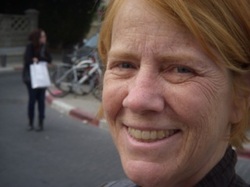 by Patricia McMillen It was a dark and stormy night. My leaky boat (actually, canoe) washed up on the nonexistent shores of Oak Park, Illinois. Parched, exhausted, I staggered to the shore, into the waiting arms of my then-boyfriend, Sam, a member of the Temple since the early eighties. My divorce wasn’t yet final, so we merely shook hands and agreed to meet again once I was free (and his kids were over 21). In the meantime, I joined the Religious Society of Friends, who were nice, but didn’t seem to enjoy drinking or singing old folk songs—other than “Magic Penny,” which gets a bit old—as much as the Oak Park Temple Reform Jews did. (Even so, I stuck with the Friends for several years, especially finding the Be-Your-Own-Preacher feature of Quakerism to be a real relief after years of scratching my head over Congregational, Methodist and Episcopalian ministers’ sermons.) Fast-forward a couple of years. Sam and I stood under the chuppah, Oak Park Temple’s then-Rabbi Gary Gerson said something in Hebrew that I repeated with only a dim idea of what it meant (apparently I promised never again to cook bacon at home, though it was still cool to order it in restaurants), and bingo bango I was re-hitched. We had a square dance wedding, something I thought only squares did, but everyone seemed to have a good time. Best of all, I got to keep the groom. Apparently I was also suddenly a member of the Temple, which is way friendly to non-Jewish spouses; however I wasn’t automatically a Member of the Tribe. No big deal, I thought; I still got to light candles with Sam, at home; got to go to High Holidays and beat my breast during the alphabetical confession; even started to feel closer to my younger sister, who had become Jewish twenty or so years earlier before marrying her husband, and who’d raised her three kids Jewish with excellent results. Even when Gary retired a few years later, and the new guy Max started presiding at Shabbats and what-alls, I was good with OPT, and it seemed good with me. I quit the Friends, freeing up my Sunday mornings to learn a little Hebrew. That was slow going, but felt ridiculously good, especially when the class would read a couple words of the Psalms, those poems my Grandmother McMillen used to give me a silver dollar for memorizing in English. Reading them in Hebrew was like, whoa. You could almost feel King David in the room trying to choose exactly the right word he wanted someone to read three thousand years later. Killer. Anyway. By now you’ve already guessed what happens next, and you’re right: I started thinking seriously about actually becoming Jewish. Met with Max a dozen or so times, read some books, went through a class with a bunch of other people thinking about becoming Jewish, talked a lot with Sam and a little bit with my sister. I thought I was ready a few times, but after going to Israel with a Temple group and still wanting to be Jewish, Max said I was finally ready. He pulled together my bet din—the rabbinic court who would ask me questions and finally certify me as a Jew—and scheduled my visit to the community mikvah. All that remained was to choose my new name—the Hebrew name by which I am now (theoretically) known by the people of Israel. I wanted something simple and not terribly historic, given that history is so often written by the victors and they are so usually not women; thus, when I heard the stewardess on my El Al flight from Eilat to Tel Aviv introduce herself as “Tova,” I knew I had what I needed. Even my Mom knew right away that it meant something good – and not until later did I learn the gloss was something OLD [as in ripe] and good. But I’ll own that gloss, too. After all, it takes some of us awhile to recognize ourselves as the Jews we have been all our lives.
2 Comments
|
Our StoriesPeople
All
Archives
October 2015
|
 RSS Feed
RSS Feed
